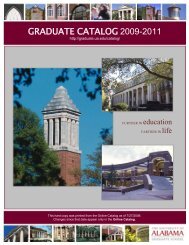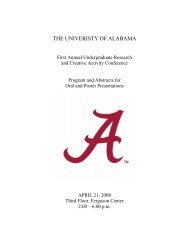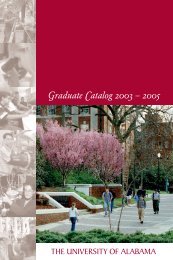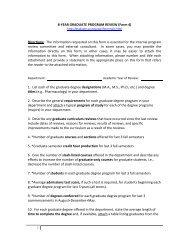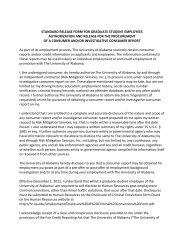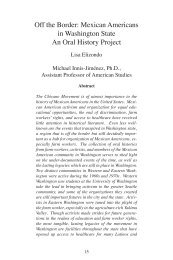Letters from a Planter's Daughter: Understanding Freedom and ...
Letters from a Planter's Daughter: Understanding Freedom and ...
Letters from a Planter's Daughter: Understanding Freedom and ...
Create successful ePaper yourself
Turn your PDF publications into a flip-book with our unique Google optimized e-Paper software.
165<br />
<strong>Letters</strong> <strong>from</strong> a Planter’s <strong>Daughter</strong><br />
a shrewd, determined girl st<strong>and</strong>ing in the doorway of Wesley’s rented little<br />
house, babies squalling in the background, Susanna smiling or scowling<br />
at her teacher until the man acquiesced. It was the same fierceness with<br />
which she wrote Cabaniss in the next year, saying i am capable of taking<br />
cair of that much money my self for i am large enough to not let any body<br />
cheat me out of it. 80 Like as not, she would cheat them right back.<br />
Despite all the hardships of the early 1860s, Susanna Townsend remained<br />
committed to continuing her education—a goal integral to her<br />
hopes for future independence <strong>and</strong> self-sufficiency. 81 Her tone, at times,<br />
is desperate: Mr Cabaniss i am still in hopes that i will get to go to school<br />
next month by you aiding assistance … if i dont get my learning now while<br />
i am young when i get old it will be to late … mr cabaniss i dont want<br />
to grow up ignorant without <strong>and</strong> education or a trade. 82 Susanna clearly<br />
believed that education was the key to building an independent future for<br />
herself, away <strong>from</strong> an unbearable home life with Wesley, who quarrels<br />
with me like i was a dog. 83 Wesley’s rheumatism periodically kept him<br />
<strong>from</strong> working, <strong>and</strong> Adelaide was no longer teaching—making Susanna,<br />
at times, the sole income in a household of five. And she, too, was sick;<br />
in 1866 Susanna began to complain of scrofula—a form of tuberculosis—<br />
which plagued her until her death. 84 Susanna’s education did not rank high<br />
on the list of immediate priorities, but the young woman, hardly more than<br />
a girl, was tenacious. 85<br />
For Susanna, the desire to be educated ran deeper than a belief that<br />
knowledge <strong>and</strong> literacy could improve her living circumstances—although<br />
this certainly was a factor. When Susanna wrote that she did not wish to<br />
grow up ignorant, she hinted at both desire <strong>and</strong> fear. She did not write that<br />
she feared to grow up poor; her anxiety came <strong>from</strong> a vision of a future self<br />
she could not bear to imagine. Susanna had tied the pursuit of knowledge<br />
80 Susanna Townsend to S.D. Cabaniss, letter dated 1 January 1866.<br />
81 Leslie A. Schwalm, A Hard Fight for We: Women’s Transition <strong>from</strong> Slavery to <strong>Freedom</strong><br />
in South Carolina. (Urbana: University of Illinois Press, 1997), 152.<br />
82 Susanna Townsend to S.D. Cabaniss, letter dated 8 August 1866.<br />
83 Susanna Townsend to S.D. Cabaniss, letter dated 28 March 1866.<br />
84 Susanna Townsend to S.D. Cabaniss, letter dated 1 January 1866.<br />
85 It would be anachronistic to place Susanna within either the political movement of Booker<br />
T. Washington or his ideology of improving the black community through assimilation of<br />
white norms, or W.E.B. DuBois’s ideas of civil rights. However, Susanna’s desire for selfimprovement<br />
as well as resistance to discrimination hints at the developing black political<br />
ideologies of the time, as well as their absorption by ordinary individuals such as Susanna<br />
<strong>and</strong> her half-siblings. Thomas Townsend, in particular, represents a Washington-esque<br />
strain of thought.



